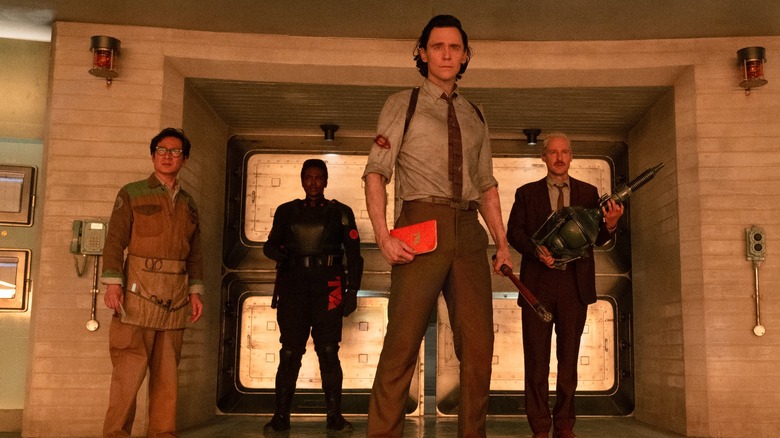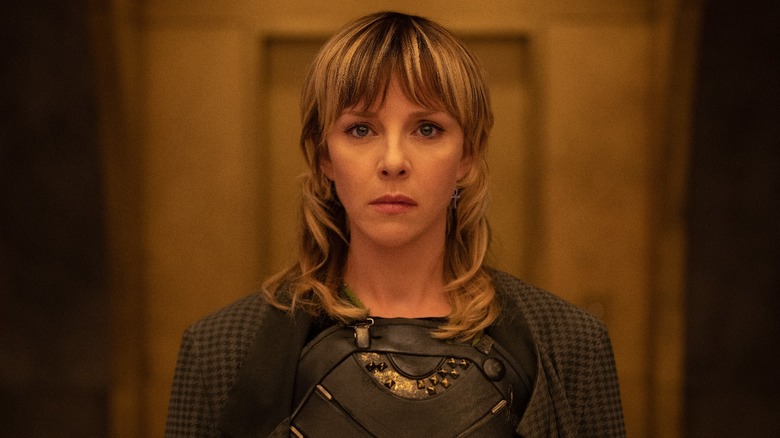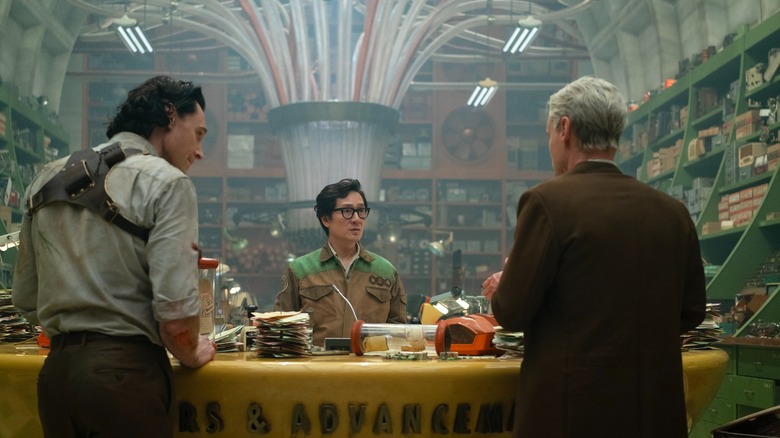Loki Season 2 Premiere Has More Walking And Talking Than A West Wing Episode
This post contains spoilers for the Season 2 premiere of "Loki."
The last time we caught up with the shenanigans within the Time Variance Authority (TVA) in "Loki," things were not looking so good. Loki (Tom Hiddleston) and Sylvie (Sophia Di Martino) encountered He Who Remains in the Citadel at the End of Time, leading to a string of events that threatened to unravel the very fabric of reality. As the end of the first season opened Pandora's box, i.e., the sudden birth of a chaotic multiverse, it is natural for season 2 of "Loki" to dive into complicated rules that demonstrate the repercussions of a world on the precipice of destruction. The season 2 premiere of "Loki" does precisely that, by bringing us up to speed while characters walk and talk frantically — enough to almost rival the longest "walk and talk" scene in "The West Wing."
However, the "Loki" premiere's "walk and talk" shenanigans are not without good reason. To begin with, we quickly learn that Loki has not been kicked into an alternate universe, but the past, which explains why Mobius (Owen Wilson) and Hunter B-15 (Wunmi Mosaku) could not recognize him in the season 1 finale. This is when the series introduces Time Slipping, an instant and rather painful method of time travel within the same timeline, which Loki is subjected to throughout the episode. The rules of Time Slipping are brand new, requiring a hell lot of expository dumps that attempt to tie disparate story threads together. The solution here, of course, is Loki and Mobius walking down the halls of the TVA while talking about errant variants, the consequences of killing He Who Remains, and what it means to live in a reality without Time Keepers, who never existed to begin with.
The web of mysteries deepen
In season 1, Sylvie revealed that everyone at the TVA are variants and that their memories have been wiped to keep the established "rules" in place. This revelation, coupled with the realization that the Time Keepers are fake, crumbles the very foundation of the organization and its goal to prune branched timelines in the name of upholding order. In the season 2 premiere, Loki is seen walking all over the TVA, accosting familiar faces and pleading them to point him towards Mobius. As Loki swaps between points in time, he realizes that events that occur in the present automatically alter the past in real time and vice-versa.
For instance, a crack on the floor caused due to Loki's escape in the past hampers the immediate present, where people just assume that the crack had been there all along. Loki and Mobius talk about the implications of this while walking through corridors and riding countless elevators, attempting to understand what's going on in relation to the rules of the TVA. Loki is clearly an anomaly, as Time Slipping is impossible inside the TVA, but it happens again and again, to the point that he and Mobius have to endanger their lives to zap him back into the present.
While the "walk and talk" routines during these reveals can be disorienting, they add to the time-sensitive nature of the crisis at hand, while also allowing some space for the signature Loki-Mobius banter that we've missed since season 1. It also allows us to better understand the TVA's layout, ranging from huge office cubicles to endless corridors flanked by imposing doorways that hide one secret or another, along with the sheer scale of the labyrinthine space with hidden nooks and crannies that haven't been explored before.
Does any of it make sense?
The Marvel Cinematic Universe's time travel shenanigans can be tricky, especially with the multiverse opening up endless possibilities with branched timelines within alternate universes. There's no way to discern what's more "real," but pruning is required to an extent, lest matters become too complicated. While the timeline rules in "Loki" become clearer as the season progresses, the premiere does introduce complications that are difficult to reconcile. The manner in which Loki is zapped back into the present feels very pseudoscience-y, as Loki's jump to the future suddenly throws us into the unfamiliar territory of Time Slipping. Is self-erasure from every timeline possible, and if so, how does it exactly work in tandem with the Time Loom — a whole new concept to unpack — that is the "beating heart" of the TVA?
The answers are vague enough to make us believe Loki's predicament in the end, and by the time both Mobius and Loki make it through, it doesn't matter. These cryptic sequences are prefaced by more walking and talking by Ouroboros or OB (Ke Huy Quan), who takes care of the scientific side of things by whipping up odd machines that help with remedying Time Slipping and sticking duct tape on a cracked spacesuit helmet. Quan's natural likability makes these exposition-heavy sequences a breeze to experience, and even when things don't make too much sense, the show finds a way to make it work and stick the landing.
What ultimately matters is that we have unquestioningly accepted temporal feedback loops that are instantaneous, and are happy to see Loki not being torn apart when he glitches through time. Maybe when all is well, we can walk and talk some more.
The season 2 premiere of "Loki" is now streaming on Disney+.


